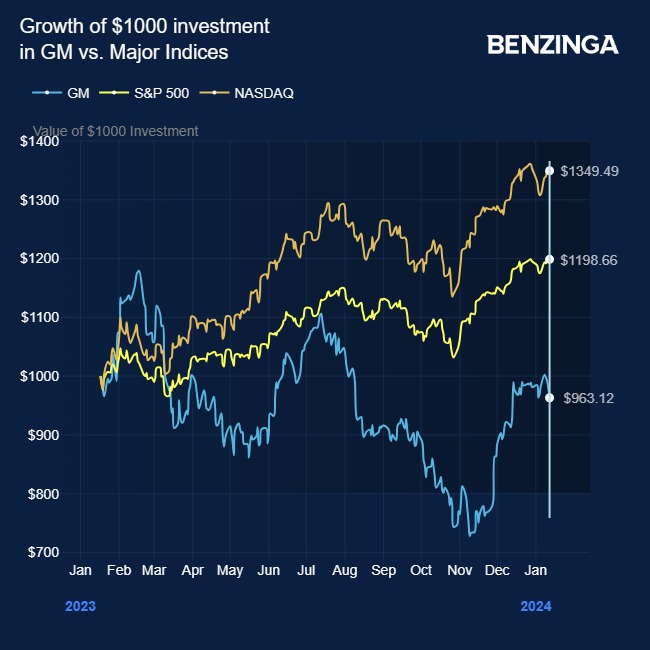Zinger Key Points
- Robotics and artificial intelligence firms could benefit from deeper automation in car industry.
- Workers could see jobs disappear if industry goes through big automation program.
- In a market dominated by tariff tensions, geopolitical surprises, and Fed uncertainty, Matt Maley's technical approach delivers clear entry/exit points for consistent income potential. Try it free for 7 days
Rising labor costs for U.S. automakers are sowing the seeds for deeper investment in automation after settlements last year to end a month of strikes at car plants across the country saw automakers agree to large wage increases for American auto workers.
The Big Three Detroit motor manufacturers agreed to pay United Auto Workers union members wage increases of around 25% in November, which will push up labor costs significantly for Ford F, General Motors GM and Stellantis STLA, which was formed by the merger of Fiat Chrysler and France’s Peugeot.
This is obviously great news for the unionized workers — but if automakers increasingly look toward automation to mitigate these rising labor costs, it could prove to be a longer-term negative for UAW workers.

UAW’s Costly Labor Agreement
Ford disclosed in November that the labor deal would cost it around $1.7 billion in lost profits for 2023, and that over the four-year term of the contract it would add a total of $8.8 billion in costs.
“We have our work cut out for us,” CFO John Lawler told a Barclays Investor conference at the time, after divulging the labor deal had cost four times that of the previous agreement in 2019. Ford execs had expected it to cost only twice that of the 2019 deal.
Lawler later said that Ford was looking at “opportunities in automation” when asked how the company would offset these costs.
Digital Age Descends On Car Industry
This could be a big threat to the UAW. The contract signed between the union and the Big Three was for four years. After this time is up, new negotiations will be underway and unions are likely to be negotiating on more than pay.
“The digital age has arrived faster than expected and is only accelerating, and the result will be the mass replacement of human labor by automation,” said Tomer Simon, chief scientist at Microsoft‘s R&D Center in Israel.
Hollywood actors and writers were striking at the same time as the carmakers last year. Their beef was on the use of artificial intelligence and other technologies in TV and movie making. Their concerns addressed issues such as the use of computerized simulations of actors and writers becoming relegated to editing AI-generated scrips.
Writing in the Harvard Business Review, Yossi Sheffi said of the UAW deal: “The agreement has achieved significant pay gains for workers but fails to adequately address issues such as how to prepare employees for automation.”
Robotics, AI Firms Could Be Winners
So which companies are the motor manufacturers going to be looking at in the quest to deepen their already large presence in automation? Car manufacturers are already large stakeholders in the robotics industry and are increasingly becoming so in artificial intelligence.
Among the biggest makers of automated manufacturing equipment are Sweden’s ABB ABBNY and Japan’s Denso Corp DNZOY and Fanuc Corporation FANUY.
But domestic companies such as Rockwell Automation ROK, which is developing robots to automate the EV industry, and Magna International MGA, which automates the manufacture of components such as electronics, are likely to be part of this revolution.
Now Read: Fitness In 2024: If You’re Going To ‘Just Do It’ — Do It Together
Photo by WorldSkills UK via Flickr.
© 2025 Benzinga.com. Benzinga does not provide investment advice. All rights reserved.
Trade confidently with insights and alerts from analyst ratings, free reports and breaking news that affects the stocks you care about.